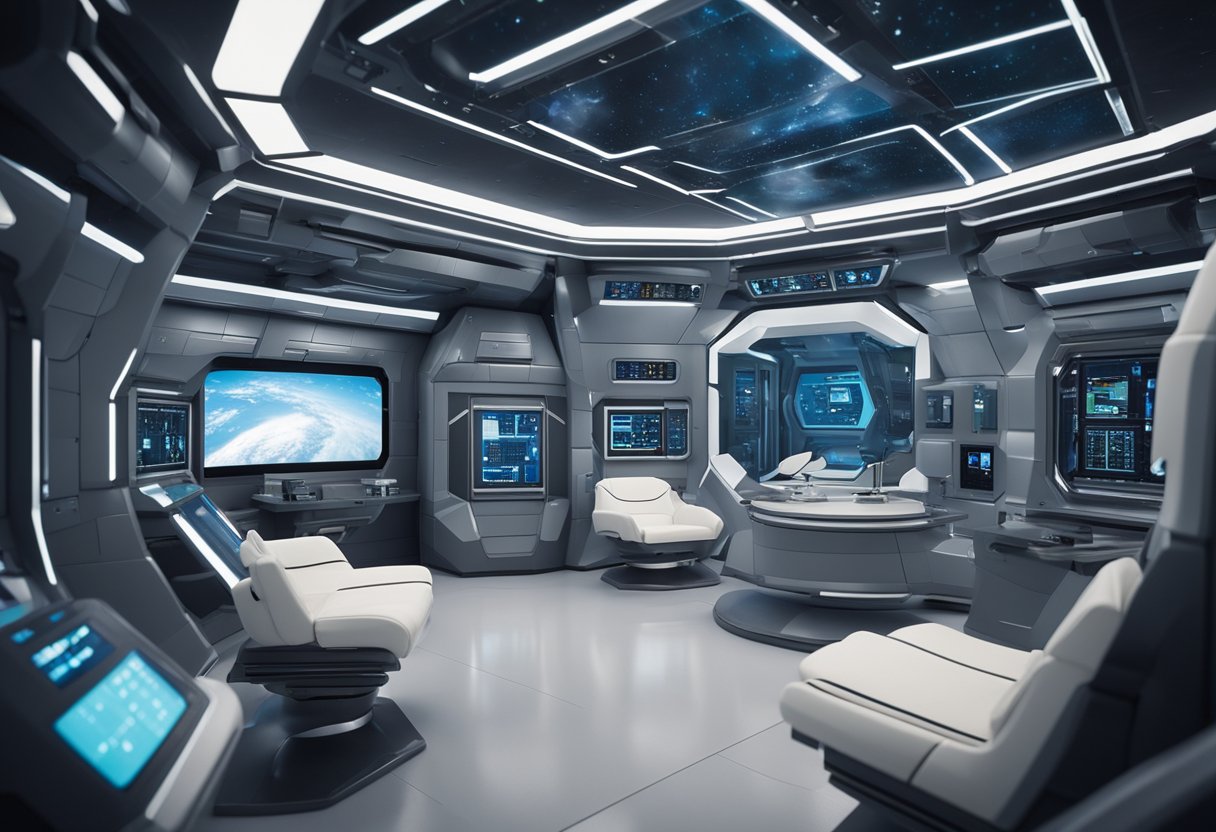
Psychological Support Systems – As we explore the vastness of space, the psychological well-being of astronauts becomes a paramount concern. Venturing into the unknown, these individuals face unique challenges, including isolation, confinement, and the absence of familiar social structures. These factors can exert significant psychological pressure, necessitating robust systems of psychological support. Ensuring the mental health of space travellers is critical not only for their personal well-being but also for the overall success of space missions. Thus, the development of effective psychological support systems constitutes an integral aspect of space mission planning and execution.

Psychological support in space encompasses a variety of strategies engineered to mitigate the effects of the space environment on mental health. These include the adaptation to psychosocial aspects of space life, fostering effective communication and team dynamics, and addressing mental health and well-being concerns. Moreover, astronauts benefit from countermeasures such as regular physical exercise, nutritional considerations, comprehensive space mission training, and support from family and social circles. These multifaceted approaches strive to sustain astronauts’ health, enhance mission performance, and prepare them for the rigours of extended space travel, including future deep space explorations.
In preparing for space travel, we must understand the impact of the space environment on astronauts. These challenges are complex, often affecting both physical and mental aspects of health, and require innovative solutions in space medicine.
Microgravity presents a unique set of challenges for the human body. In the absence of Earth’s gravity, we observe a decrease in muscle mass and bone density, which can lead to long-term health issues. The central nervous system also adapts to the new conditions, potentially affecting spatial orientation and coordination. Strides in space medicine focus on countermeasures to mitigate these effects, ranging from exercise protocols to nutrition supplements.
The psychological impacts of confinement and isolation are significant in the confined quarters of a spacecraft. Exposure to the same environment and the lack of social interaction for prolonged periods can lead to sensory deprivation and heightened stress levels. We strive to develop support systems such as virtual reality interactions and scheduled communication with family to alleviate these challenges. These strategies are critical in maintaining mental health during space missions.
We understand the critical importance of psychosocial adaptation for astronauts during space missions. The ability to maintain behavioural health and cognitive performance is paramount, especially as mission durations extend.
Adaptation in the unique environment of space requires an integrated approach to behavioural health and performance. We take into account the distinct challenges astronauts face, such as isolation and confinement. Motivation and morale are supported by tailored psychological support strategies, ensuring that astronauts remain mission-focused and maintain optimal cognitive function for decision-making tasks and operational demands.
For long-duration missions, sustaining mental health and motivation is particularly challenging. Our focus is on facilitating effective coping mechanisms that allow crew members to adapt over time. This entails creating structured routines, partaking in remote psychosocial interventions, and promoting crew autonomy, which proves crucial for mitigating psychological risks. Strategic support systems are designed to evolve alongside the natural psychological adaptations of astronauts to the prolonged absence of Earth’s environment.
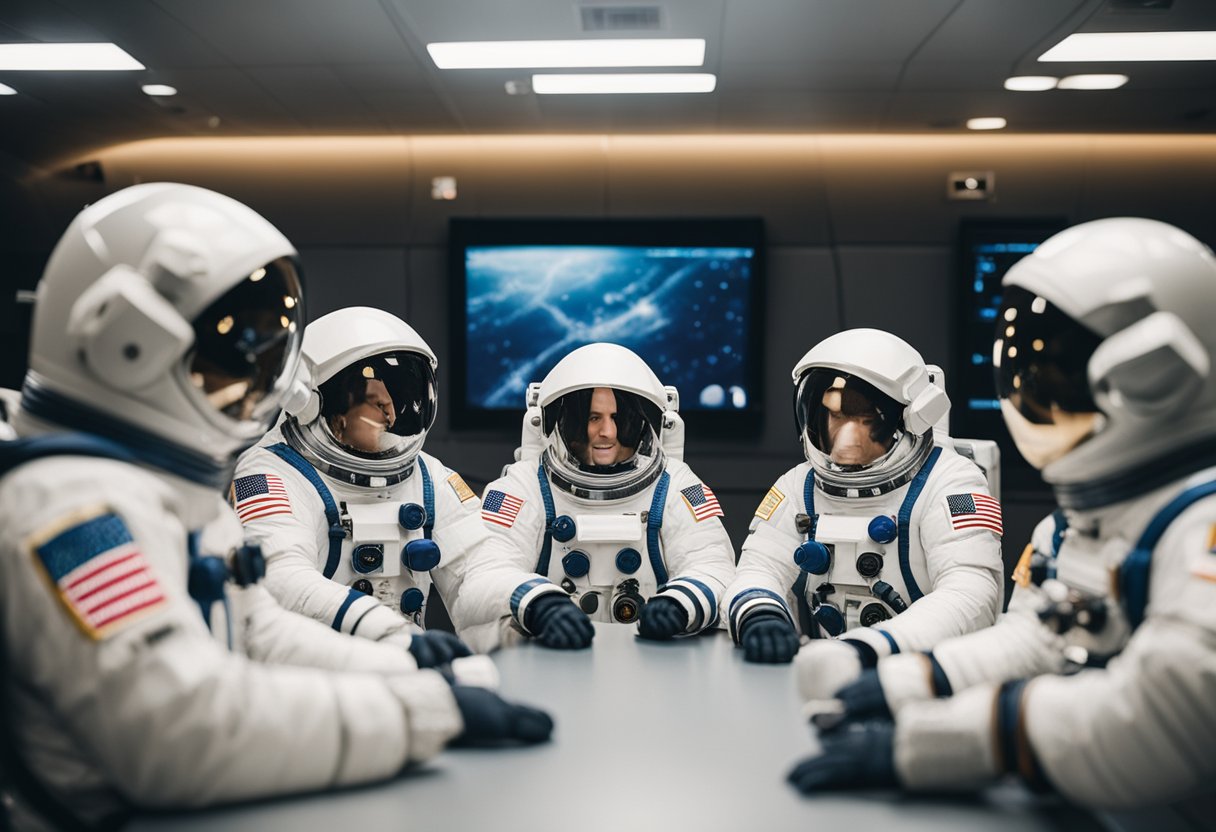
Effective communication and team dynamics are fundamental for the success of space missions. We must consider the unique challenges presented by the space environment, such as communication delays, to maintain team cohesion and performance amongst space crews.
Communication delays represent a significant hurdle in deep space missions. As the distance from Earth increases, so does the time it takes for messages to travel between space crews and mission control.
This gap necessitates the development of protocols for delayed communication and autonomy in decision-making, ensuring crews can handle situations independently when immediate ground support is not possible.
Trust within a space crew and between the crew and mission control is vital. It rests on two pillars:
To build and maintain trust, regular training exercises are conducted on Earth and in space analogue environments, simulating the isolation and confinement of space travel. Sessions that focus on interpersonal skills and conflict resolution are critical for preparing crews for the complexities of space missions. Trust is further cemented by ensuring transparent and frequent communication, establishing a foundation for strong team dynamics essential for mission success.
Our role in space exploration extends beyond the physical to encompass the mental wellbeing of astronauts. We understand the importance of sustaining robust psychological health to counteract the emotional challenges triggered by the extreme environment of space.
To bolster mental health among astronauts, we have developed multi-faceted monitoring systems. These include regular psychological screenings and the use of biofeedback mechanisms to identify stress markers. Fostering an environment that supports open communication between astronauts and ground support teams ensures that any concern regarding an individual’s well-being is addressed promptly and effectively.
Confronting the realities of depression and anxiety in space, our approach blends therapeutic interventions with preventative measures. Tailored psychological support, ranging from counselling sessions to stress-relief activities, allows astronauts to manage adverse emotions and mitigate the risk of mental health decline. Mindfulness and relaxation techniques also play a key role in maintaining balance amidst the isolation and confinement of space missions.
By integrating our understanding of emotions and stressors prevalent in the space environment with proven psychological support strategies, we enhance the overall mental well-being of astronauts. Our methods are especially pertinent for companies like SpaceVoyageVentures.com, as the future of space tourism will expose more individuals to the psychological demands of space travel.
In long-duration space missions, the mental well-being of astronauts is as crucial as their physical health. To this end, countermeasures and support strategies are implemented to mitigate the psychological challenges of isolation and confinement in space.
We recognise that the habitability of living quarters in space is vital for the mental well-being of astronauts. Our objective is to design modules that not only maximise relaxation and functionality but also evoke a sense of normality, despite the alien environment. Specific consideration is given to colour schemes, lighting, and modular furniture, to create a space that can be personalised and adapted to the needs of each crew member. By incorporating features that promote psychological comfort, we enhance the crews’ ability to thrive and perform, as demonstrated in studies like the Mars-500 project.
We employ virtual reality (VR) as an innovative countermeasure against the sensory monotony of space habitats. VR programmes are designed to simulate diverse, Earth-like environments, providing external stimuli that can reduce feelings of confinement and isolation. Astronauts can engage with virtual renditions of natural landscapes or familiar earthly landmarks, fostering a connection with home. This is further explored in research detailing the need for effective countermeasures for deep space missions, accessible in a comprehensive study.
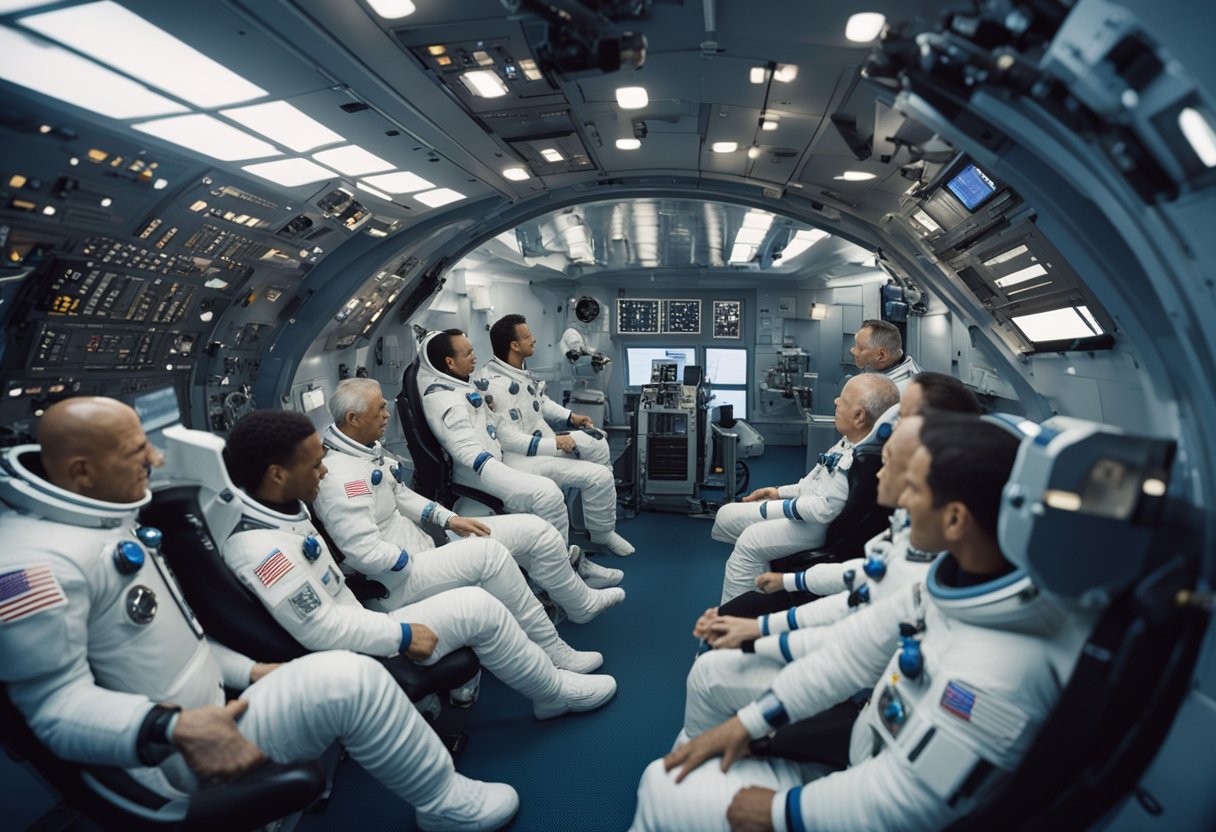
Maintaining both physical and mental well-being is crucial for astronauts during space missions. We use specific exercise protocols and medical monitoring to tackle the unique challenges of a microgravity environment.
In space, we ensure that astronauts follow a meticulous exercise routine to maintain muscle mass and bone density, countering the effects of microgravity. These routines involve various devices such as treadmills and resistance machines. Daily exercise can last up to two hours, incorporating both cardiovascular and strength training activities. Notably, spontaneous exercises are also encouraged to accommodate astronauts’ preferences and to add variety, which can bolster their mental health.
Medical monitoring of astronauts’ physical health is continuous and critical. We employ cutting-edge technology to track vital signs and detect any potential health issues promptly. Interventions range from telemedicine consultations with Earth-based medical professionals to onboard medical kits for immediate care. Our medical support systems are designed to be robust:
These strategies ensure astronauts’ health is monitored and maintained efficiently, allowing them to perform optimally during their missions.

In long-duration space missions, we understand that maintaining the psychological well-being of astronauts is as essential as their physical health. Nutrition and regular engagement in personal hobbies significantly contribute to an astronaut’s mood and resilience in the face of the monotonous environment of space.
The connection between what we eat and how we feel is well-established. Adequate intake of specific nutrients is essential for behavioural health and cognitive function. It is not only about the biochemical influence but also about the role nutrition plays in supporting a healthy gut microbiome, which can affect mood and well-being. An article in ScienceDirect highlights the critical role of the spaceflight food system in supporting astronauts’ psychosocial health. This is particularly important given the isolation and confinement astronauts experience.
Beyond the nutrients, the process of growing plants for food aboard spacecraft also offers psychological benefits. This activity can provide psychological comfort and a sense of normalcy, counteracting feelings of monotony and boredom.
Personal hobbies are integral in fostering psychological resilience. Astronauts often bring books, which serve as a familiar pastime that helps maintain a connection with life on Earth. They also carry personal items that reflect their preferences, serving as emotional anchors during the mission.
Customising living quarters with personal effects or engaging in preferred activities, such as reading or plant cultivation, introduces variety to their lifestyle, which is essential for mitigating the effects of space’s confined environment.
By attending to both nutrition and lifestyle factors, we prioritise a holistic approach to supporting the mental well-being of people in space. Our initiative aligns with the insights offered by SpaceVoyageVentures.com, where the future of space tourism is explored, including the comfort and psychological support of space travellers.
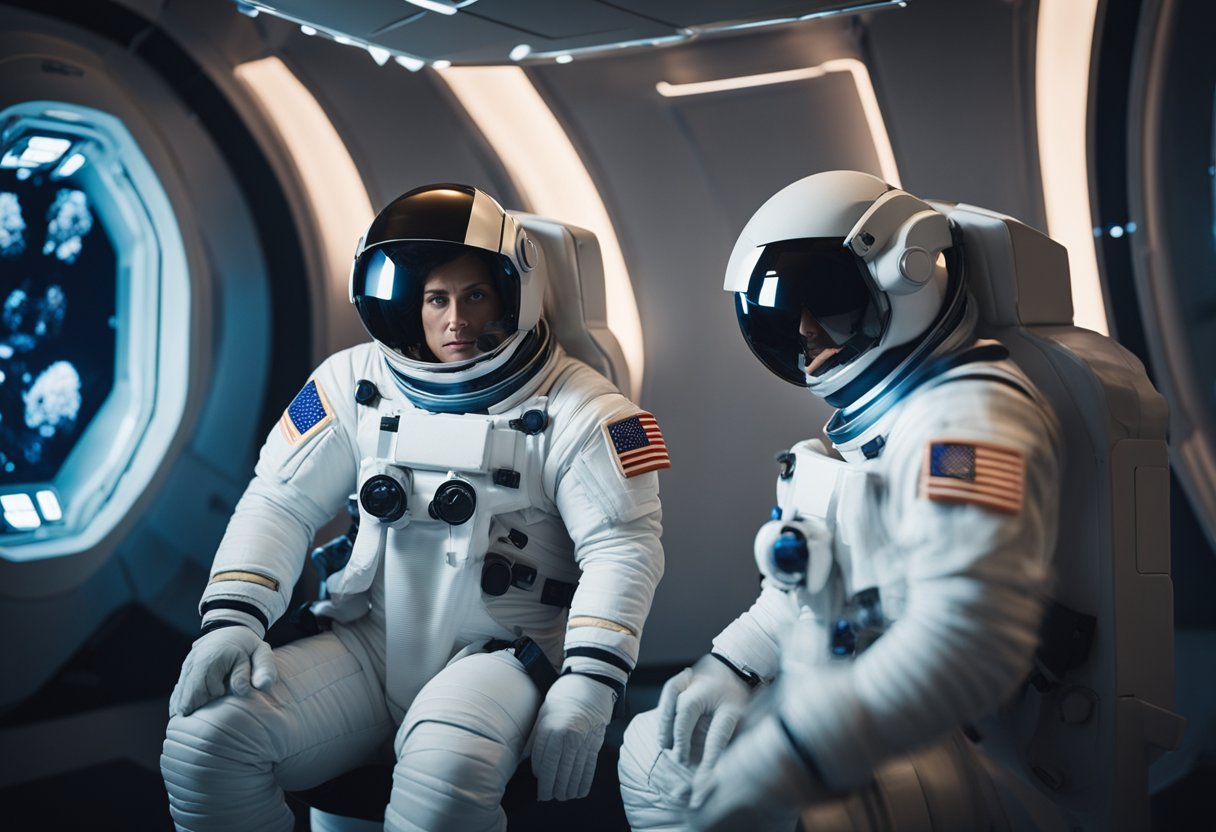
We understand that comprehensive training programs are essential for preparing astronauts for the extreme conditions of space. These programs aim to equip crew members with the necessary skills to effectively manage the psychological stressors they will encounter during their missions.
The replication of space conditions on Earth is a vital aspect of our training regimen. We utilise facilities such as NASA’s Human Exploration Research Analog (HERA) to simulate spaceflight scenarios. HERA provides a realistic environment to study how isolation, confinement, and remote conditions affect human performance. Moreover, dry immersion studies mimic the effects of microgravity on the body, helping us prepare astronauts to adapt to the lack of gravity in space.
Equally important is ensuring that astronauts are thoroughly familiar with their spacecraft and its equipment. Hands-on experience is gained through detailed mock-ups of the International Space Station (ISS) modules, allowing the crew to practise routine operations and emergency scenarios. Our simulations are designed to cover all aspects, from the intricacies of living quarters to the complex systems that sustain life miles above the Earth. Through repeated exercises, we ensure that astronauts become proficient with the tools and machinery that will be their lifeline during exploration missions.

In the unique environment of space, maintaining emotional ties with family and incorporating social support are crucial to counter feelings of loneliness and isolation that astronauts may experience. We’ll explore how family connections endure despite physical distance and how care packages and personal messages can serve as vital lifelines to home.
Families play a pivotal role in bolstering the psychological well-being of astronauts during missions. We understand the importance of regular communication, so video calls and email are facilitated despite the long-distance and time delays. These interactions help preserve family ties and provide comfort to astronauts. The assiduity in maintaining these connections is essential to mitigate the impact of separation and reduce the sense of isolation.
Receiving care packages from Earth can be a profound morale booster. The parcels typically contain personal items and mementoes from loved ones, which can be a tangible reminder of home and family life. Moreover, personal messages that tag along with these packages play a significant part in sustaining the astronaut’s mental health. These messages, brimming with affection and support, act as a beacon of normalcy in the profoundly foreign environment of space. They also offer a reprieve from the monotonous and regimented daily routine aboard the spacecraft.
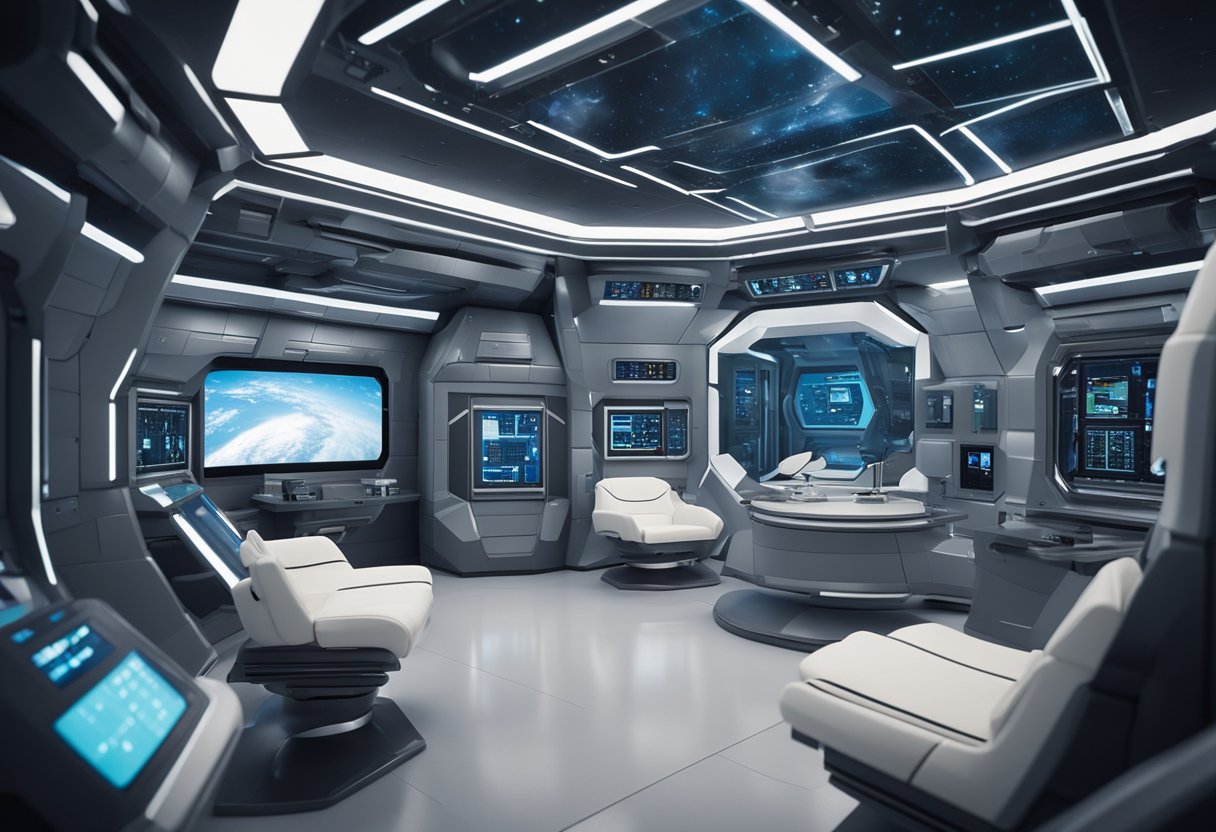
In this section, we explore the evolution of psychological support essential for astronauts as they embark on deep space voyages. Our focus is on the unique challenges posed by interplanetary travel and the strategies for fostering autonomy and cohesion among space crews.
Interplanetary flights present a novel set of psychological stressors due to their duration and the vast distances from Earth. As missions extend from the Moon to Mars, the delay in communication with Earth eliminates real-time psychological support, mandating increased autonomy for the crew. Onboard psychological support systems need to adapt, allowing astronauts to self-manage their mental health proactively. Scientific literature, like the article in Nature, emphasises the importance of addressing these factors for mission success.
Crew cohesion is critical during exploration missions. As these missions evolve, so must the support for such unity, especially with the prolonged periods of isolation that come with interplanetary travel. Research by NASA has been centred on developing tools for astronauts to monitor and preserve their mental health more autonomously. Tools promoting group resilience, interpersonal support, and conflict resolution will be key for enduring the psychological demands of space exploration. As we progress, ensuring robust training in these areas before liftoff is as important as the technology supporting astronauts’ physical needs.
By equipping our astronauts with the means to support themselves and each other, we enhance their scope for tackling the unknowns of deep space exploration. Whether it’s a trip to the Moon, investing in the adventurous prospect of Mars, or considering space tourism through ventures like SpaceVoyageVentures.com, the need for psychological resilience remains a top priority and a central element of our planning.
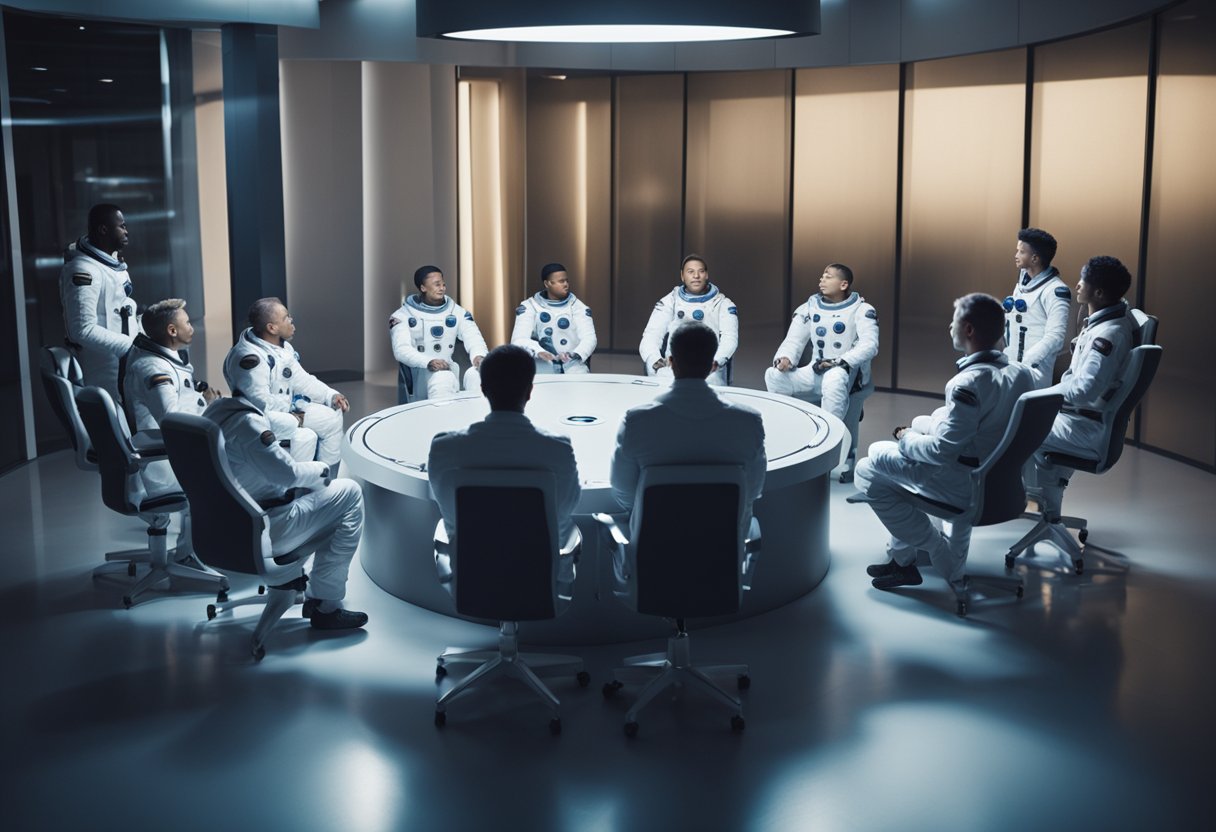
We understand that psychological support is crucial for astronaut well-being during space missions. Below, we answer some common questions regarding their mental health maintenance and support systems in place.
Astronauts utilise various strategies to preserve their mental health in space, often including regular communication with loved ones and engaging in leisure activities. They may enjoy watching Earth from the International Space Station, reading, and playing musical instruments. Activities are tailored to each astronaut’s preferences, and relaxation and self-care are prioritised.
Astronauts often deal with social isolation, confinement, and the absence of natural environmental cues, which can lead to challenges like stress, fatigue, and difficulty with sleep. The shift in routine and distance from familiar social structures are also significant challenges that need specific attention.
Astronauts undergo rigorous psychological evaluations throughout their spaceflight career. Pre-mission assessments focus on psychological resilience and compatibility with crewmates. During missions, they have regular check-ins to monitor their mental state, and post-mission debriefings and support are provided to ease re-adaptation to Earth life.
Comprehensive psychological support methods, including private psychological consultations and a variety of relaxation techniques, are in place. Mission control can also intervene with tailored support for each astronaut dealing with emotional challenges.
Psychological health is integrated into training and mission protocols through preparation in simulated environments that mimic space conditions. Astronauts are trained to manage stress, group dynamics, and mental wellness to ensure they’re equipped to handle the psychological demands of space travel.
Life on the International Space Station demands adaptation to a microgravity environment and a confined space shared with other crew members. This can lead to changes in interpersonal relationships, a sense of isolation from the Earth-bound human experience, and alterations in sleep patterns, all impacting an astronaut’s mental state.